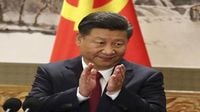In a notable shift in global diplomacy, Chinese President Xi Jinping has skipped the 17th BRICS summit held in Rio de Janeiro, Brazil, marking the first time since he took power in 2012 that he has missed this annual gathering. Instead, Premier Li Qiang represented China at the event, signaling a focus on domestic priorities over international engagements. This decision comes amid China’s mounting economic challenges and ahead of a significant political meeting expected later this year.
The BRICS summit, which convened on July 6, 2025, brought together leaders from major emerging economies, including Brazil, Russia, India, China, and South Africa, along with newer members such as Egypt, Ethiopia, Iran, Indonesia, and the United Arab Emirates. However, alongside Xi, Russian President Vladimir Putin also opted out of attending in person, joining via video link due to an International Criminal Court (ICC) arrest warrant. This absence of two of the bloc’s most powerful leaders has raised questions about the cohesion and future direction of BRICS.
China officially cited scheduling conflicts for Xi’s absence, but analysts suggest deeper reasons. The Asian giant faces a complex economic situation: industrial profits plunged by 9.1% in May compared to the previous year, consumer spending remains sluggish, and the real estate market continues to struggle. Additionally, ongoing trade tensions with the United States add further pressure. Chong Ja Ian, associate professor at the National University of Singapore, told CNN, “BRICS may just not be his greatest priority as he focuses on steering China’s domestic economy.”
Moreover, some experts speculate that Xi’s absence might signal internal political shifts. Reports from China’s state-run Xinhua news agency mentioned a recent Political Bureau meeting reviewing new regulations for party institutions, which some interpret as preparations for a potential power transition. Gordon Chang, a US-China relations expert, told Fox News that Xi’s absence is “extremely significant,” suggesting “turbulence at home” and signs that Xi may have lost control over the military, with civilian rivals reasserting influence.
Despite these theories, others caution against overinterpretation. The rapid expansion of BRICS—from its original five members to include several new countries with diverse political and economic profiles—has diluted the group’s ideological coherence. The Associated Press reported internal divisions over responses to conflicts such as Israel’s war in Gaza and recent strikes on Iran, with some members calling for a firmer stance while others remain cautious. This fragmentation may have influenced Xi’s decision to skip the summit.
Meanwhile, Russia’s Vladimir Putin refrained from attending in person due to an ICC arrest warrant related to alleged war crimes in Ukraine. Brazil, as a signatory to the ICC statute, would be obliged to arrest Putin if he were physically present. This legal complication forced Putin to participate remotely, as he did at the 2023 BRICS summit in South Africa.
In contrast, Indian Prime Minister Narendra Modi and South African President Cyril Ramaphosa were among the high-profile leaders attending the summit. Modi used the platform to deliver a pointed critique of Pakistan, condemning its alleged support for terrorism and emphasizing that such actions should not be tolerated for political convenience. Indonesia’s President Prabowo Subianto also attended following Indonesia’s official accession to BRICS earlier this year.
The summit’s agenda focused on pressing global issues, including trade tensions with the United States. President Donald Trump’s temporary freeze on new tariffs was set to expire on July 9, 2025, putting pressure on BRICS countries to negotiate trade deals to avoid punitive tariffs. Trump warned that any country aligning with what he termed “anti-American” BRICS policies would face an additional 10% tariff, signaling a tough stance toward the bloc.
Among the key topics was the ongoing discussion of de-dollarization, the effort to promote trade in national currencies rather than the US dollar. While the idea of a shared BRICS currency, proposed by Brazil’s President Luiz Inácio Lula da Silva in 2024, was introduced, it was not expected to be seriously debated due to the risk of provoking harsh US trade retaliation. Premier Li Qiang, representing China, was anticipated to emphasize strengthening energy cooperation and advancing the use of China’s digital currency in trade transactions.
Brazil, as summit host, aimed to steer the discussions toward pragmatic themes such as global governance reform, green energy transition, vaccine cooperation, and expanding most-favored nation status within the World Trade Organization. President Lula da Silva sought to avoid the summit being dominated solely by criticism of Western policies, reflecting Brazil’s ambition to emerge as a diplomatic leader within the Global South.
The absence of Xi Jinping and Vladimir Putin, however, inevitably diminished the summit’s impact. Xi’s nonattendance deprived China of a key opportunity to reinforce its leadership role among developing nations and present itself as a stable counterweight to Western influence—a role Beijing has long cultivated. Putin’s absence, constrained by legal concerns, underscored the geopolitical complexities facing BRICS amid ongoing conflicts.
Since its inception in 2006 as BRIC, with Brazil, Russia, India, and China, the group expanded to include South Africa in 2010, becoming BRICS. Its goal has been to unite emerging economies and challenge the dominance of wealthier Western nations. The recent inclusion of countries like Egypt, Ethiopia, Iran, Saudi Arabia, the UAE, and Indonesia reflects the group’s evolving nature but also introduces challenges in maintaining unity and coherent policy stances.
As the 2025 BRICS summit concluded, observers noted the mixed signals sent by the attendance and absences of key leaders. While the summit underscored the bloc’s continued relevance in global affairs, it also highlighted internal tensions and shifting priorities among its members. With China’s domestic economic hurdles and possible political transitions, alongside Russia’s international legal predicaments, BRICS faces a pivotal moment in defining its future role on the world stage.

